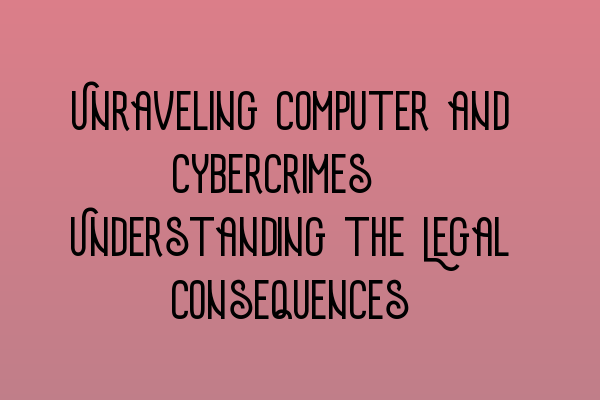Unraveling Computer and Cybercrimes: Understanding the Legal Consequences
As technology continues to advance at a rapid pace, the world becomes more interconnected than ever before. With this increased connectivity, however, comes the inevitable rise in computer and cybercrimes. These offenses pose significant threats to individuals, businesses, and even national security. Understanding the legal consequences associated with computer and cybercrimes is crucial in ensuring that justice is served and the perpetrators are held accountable.
What are Computer and Cybercrimes?
Computer and cybercrimes encompass a wide range of illegal activities committed using computers, computer systems, and networks. These offenses include but are not limited to unauthorized access, data theft, hacking, phishing, identity theft, online fraud, and the dissemination of malicious software or malware. As technology evolves, so do the methods and techniques employed by cybercriminals, making it more challenging to detect and prevent such crimes.
The Legal Consequences
Committing computer and cybercrimes is a serious offense that carries severe legal consequences. In the United Kingdom, the Computer Misuse Act 1990 is the primary legislation governing these types of crimes. The act criminalizes unauthorized access to computer systems, the modification of computer data without permission, and the creation and distribution of malicious software. Violators of this act can face imprisonment for up to two years for unauthorized access and up to ten years for offenses related to hacking and the creation and distribution of malware.
Additionally, depending on the nature and severity of the cybercrime committed, other laws may come into play, such as the Data Protection Act 2018 and the Fraud Act 2006. The consequences for these offenses can be even more severe, with possible prison sentences of up to 14 years for data theft and up to 12 years for fraud.
The Importance of Legal Expertise
Given the complex nature of computer and cybercrimes, relying on legal expertise is crucial for both victims and defendants. Solicitors who specialize in criminal law, specifically in the field of computer and cybercrimes, possess the knowledge and experience necessary to navigate these complex legal matters. They can provide valuable guidance to victims seeking justice and ensure that defendants receive fair and just treatment throughout the legal process.
Conclusion
Computer and cybercrimes pose significant threats to individuals, businesses, and national security. Understanding the legal consequences associated with these offenses is vital for both preventing and prosecuting cybercriminals. By enlisting the help of legal experts specializing in computer and cybercrimes, victims can seek justice, and defendants can receive fair treatment in accordance with the law.
Related Articles:
- Demystifying the Solicitors Qualifying Examination Format
- LLC Formation Made Simple: Step-by-Step Guide for UK Entrepreneurs
- LLC Formation: A Step-by-Step Guide for UK Entrepreneurs
- Business Regulations in the UK: A Comprehensive Overview
- Ethical Considerations in UK Law: Upholding Professional Standards
